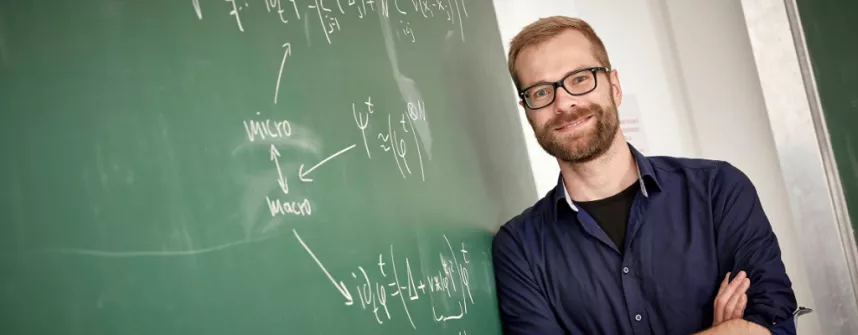Funding for French-German Research Project on Quantum Technology
November 2, 2022
In a project funded by the German Research Foundation (DFG), a team of German and French researchers aims to solve the challenges of effective equations in quantum technology. Sören Petrat, Professor of Mathematics at Jacobs University Bremen, is scientific coordinator of the project on the German side.
The Royal Swedish Academy of Sciences in Stockholm awarded this year’s Nobel Prize in Physics for groundbreaking work in this field. In highly complex quantum physics, two or more particles can be entangled and thus dependent on each other. What happens to one of the particles in an entangled pair determines what happens to the other particle, even if both particles are far apart.
This phenomenon of entanglement has to be controlled, because it causes the equations describing realistic quantum systems to become far too complicated to solve analytically or numerically. Simpler, so-called effective equations provide a remedy. “If I want to describe a gas or simply the air in a room, I'm usually not interested in the motion of each individual atom. Instead, I'm interested in quantities like temperature, pressure, or volume. These are all examples of effective quantities-” Petrat puts it into simple words.
In the research project, the team is mathematically investigating ultracold gases near the absolute zero of minus 273.15 degrees Celsius - so-called cold Fermi and Bose gases, whose properties are used in quantum technology. "Our goal is to rigorously derive such effective equations mathematically," Petrat said. These equations, for example, are indispensable for quantum computers. "For me, this is a very exciting area of research because there is an extreme amount of progress currently coming together in three areas: experimental physics, theoretical physics and mathematics."
Five scientists from four universities are involved in the research project entitled "Effective approximation and dynamics of many-body quantum systems." In addition to Sören Petrat, these are Professor Volker Bach, mathematical physicist at TU Braunschweig, and the mathematicians Professor Sébastien Breteaux and Professor Jérémy Faupin from the Université de Lorraine and Professor Zied Ammari from the Université de Rennes. "We are very pleased to be able to continue the long and successful Franco-German collaboration on this topic with this funding," Petrat said.
Questions are answered by:
Dr. Sören Petrat | Professor of Mathematics
Email: s.petrat [at] jacobs-university.de | Tel: +49 421 200 3211
